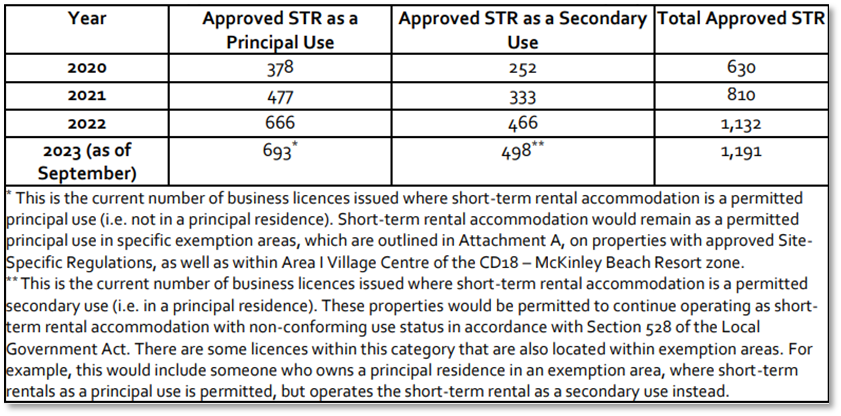A BALANCED APPROACH TO IMPLEMENTING NEW SHORT-TERM RENTALS LEGISLATION (2024)
Issue
The recently passed Bill 35 (October 26, 2023) of the Short-Term Rental Accommodations Act in British Columbia marks a significant shift aimed at freeing up accommodation to mitigate the housing crisis in BC. The legislation goes into effect May 1, 2024.[1]
Switching housing stock from short-term rental to long-term rental and/or purchase by prospective homebuyers to use as a permanent residence is unprecedented in BC. Reaction from owners of STR (short-term rental accommodation) has been swift and mostly negative. Municipalities and regional districts are scrambling to comply with deadlines and manage residents’ concerns.
Background
It is recognized that short-term rentals can supplement the accommodation market and provide homeowners with additional income opportunities. Nonetheless, an appropriately regulated process is required to preserve the housing stock for long-term rentals while managing tourism impacts. The challenge faced by municipalities and regional districts is to find a balance in regulating short-term rental activity to continue to enhance the benefits and opportunities of the emerging industry while reducing any detrimental effects on housing and neighbourhood livability.
Municipal and regional district planning departments are quickly pivoting in response to the new and still evolving provincial legislation and regulations: taking proposed bylaw amendments to their respective Councils for consideration and adoption in order to comply with the new Act, at the same time as reviewing and revising bylaws to comply with new provincial regulations requiring modification of Official Community Plans to deal with changed height restriction, densification and other measures, again aimed at easing the housing availability crisis. Short-term rental regulations form only a part of the shift, as densification, transit hub regulations, and height requirements are adopted at the provincial level, which has immediate downstream effects on localities throughout the province.
According to the Provincial Government, this legislation will give local governments stronger tools to enforce short-term rental bylaws, return short-term rental units to the long-term rental market and establish a new Provincial role in regulating short-term rentals. The regulations and responsibilities under the Short-Term Rental Accommodations Act will be phased in, coming into effect at different times from 2023 to 2025.[2]
The government’s Short-Term Rental Accommodations Act defines a short-term rental as accommodation provided to members of the public in a host's property in exchange for money for a period of less than 90 consecutive days.[3]
BC has made regulations restricting short-term rentals to principal residences and either a secondary suite or an accessory dwelling unit (ADU) in many BC communities, starting May 1, 2024.[4]
This legislation is broad and sweeping in nature and is already having unintended but perhaps predictable negative consequences for tourist-centred economies, students, homeowners, and retirees whose financial security is tied to income-generating properties.
Kelowna, Powell River, Victoria, and Vancouver generally limited short-term rentals to principal residences prior to Bill 35. That means only the homeowner who lives in the unit, or the tenant, may list the unit as a short-term rental. Investors who do not live in the residence may not list a unit (or units) as a short-term rental. In Kelowna, for instance, where nearly 1,200 STRs were legal, i.e., licensed and operating as of September 2023 (verified November 2023) and expected to continue doing so, clarifying regulations from the province in early 2024, now see that number reduced to 498. See Table 1.
Table 1 – Number of approved short-term rental (STR) business licences per year since 2020, as of September 2023
Source: City of Kelowna Council Archives[5]
Again, as an example of the confusion across the province when the legislation was being adopted, the City of Kelowna and many other municipalities and regional districts interpreted the new Act as enabling exemptions, particularly for licensed STRs and hotels in tourism/vacation-designated areas. As of February 2024, these exemptions do not appear to be viable, even for tourist-centric areas.
At the two-day UBCM Housing Summit in Vancouver on February 13 and 14, 2024, frustration over this interpretation was voiced by many, including the Mayor of Parksville, according to the Vancouver Sun: “Parksville Mayor Doug O’Brien says custom-built, short-term rental suites in his community should be exempt from principal ownership rules under BC’s Short-Term Rental Accommodation Act.”[6] In this case, the impact is on retirees, tourists, and the local economy of a small municipality on the Island.
At the same Summit, Julius Bloomfield, Mayor of Penticton – another long-standing tourist destination – said, “There are between 400 and 500 short-term rental suites in Penticton. And around half of those will not comply with the new law.”
Bloomfield said that finding the balance was the key to making the new legislation work. He noted that the short-term rental market had gone from unregulated to severely regulated in just a few years. “That could bring chaos,” he said. “We need gradual transition to grandfather in (suites). We want balance.”
This policy is calling for that same balance, transition time, consideration of exemptions, and nuances in the legislation, specifically:
Student Housing
Some homes are being used for student housing during the school year and short-term rentals during the summer months while students are away. Recognizing the unique circumstances of student accommodation, we recommend allowing for flexibility in the legislation. Student accommodation providers who maintain long-term rentals for nine months of the year should be permitted to engage in short-term rentals for the remaining three months. This provision supports educational opportunities for students without compromising the intent of the legislation.
Grandfather Clause for Financial Hardship
Seniors in BC are increasingly struggling with poverty.[7] We propose a grandfather (or legacy) clause to provide leeway for property owners, specifically seniors, who have purchased units for short-term rentals and who provably demonstrate financial hardship if they are unable to utilize their properties for that purpose. Clear criteria and documentation requirements should accompany this clause to ensure fairness and accountability.
Sunset Clause with Thresholds for New Builds
A sunset clause would address the legislation's effects on existing and future developments. Short-term rental limitations should apply to new builds starting from a specified year, with provisions for properties built within the past five years. This approach considers economic factors such as inflation and mortgage renewal rates, safeguarding property owners from unforeseen financial burdens.
Exemptions for Resort and Tourism Primary Towns
Recognizing the importance of resort towns and tourism-driven economies, we recommend exemptions in areas where tourism serves as a primary economic driver. Resort-style areas should be given special consideration due to their reliance on short-term rental revenue to sustain local economies. Exemptions should align with long-term zoning plans and economic development strategies, promoting sustainable tourism practices while maintaining community vibrancy.
Review of the Residential Tenancy Act and Further Resourcing for Residential Tenancy Branch
In conjunction with amendments to short-term rental legislation, we urge a comprehensive review of the Residential Tenancy Act to ensure equitable landowner treatment. Currently, the reputation of the RTA is to favour the tenant’s rights over the landowner's rights, making prospective landlords hesitant to lease out viable spaces. Furthermore, if the intent of the legislation to release 16,000 units into the rental market, which are currently being used for short-term rentals, is to be realized, then the Residential Tenancy Branch needs to be adequately equipped for the flood of tenancy issues and arbitration, which will follow. Revisions should prioritize a balanced approach that protects both tenants' rights and landlords' interests, fostering a favourable environment for property management and investment.
In conclusion, the Kelowna Chamber of Commerce recommends a strategic approach to amend the new provincial legislation on short-term rentals in British Columbia. By incorporating differential provisions, grandfather clauses, sunset provisions, exemptions for tourism-driven economies, and a review of tenancy laws, policymakers can achieve a balanced regulatory framework that supports responsible short-term rental practices while safeguarding the interests of property owners and communities.
The recommendations below address the need for nuance in the legislation. “In conclusion, the Kelowna Chamber of Commerce recommends a strategic approach to amend the new provincial legislation on short-term rentals in British Columbia. By incorporating differential provisions, grandfather clauses, sunset provisions, exemptions for tourism-driven economies, and a review of tenancy laws, policymakers can achieve a balanced regulatory framework that supports responsible short-term rental practices while safeguarding the interests of property owners and communities.”
THE CHAMBER RECOMMENDS
That the Provincial Government:
- Create a provision for student accommodation to be balanced by a 90-day short-term rental outside the nine-month period accommodation is needed for students.
- Ensure summer and winter tourism visitors can be accommodated through necessary exemptions to the legislation within the 90-day ‘high summer season’ of tourism, i.e., June-August and the winter ski season for ski communities.
- Create a legally defined framework for current licensed short-term rental owners to furnish evidence supporting extreme personal financial hardship claims, allowing them to present their case and seek appropriate consideration or exemption under the legislation.
- Incorporate a legacy clause establishing a particular year as the threshold at which the new short-term rental regulations apply to reduce adverse impacts on current short-term rental owners.
- Restore confidence in the Residential Tenancy Act for landlords transitioning from short-term to long-term rentals by conducting a comprehensive review of the RTA and its regulations. Ensure equitable treatment for landlords while balancing the protection of tenants’ rights and landlords’ investments.
[1] Overview: BC's short-term rental accommodations legislation https://www2.gov.bc.ca/gov/content/housing-tenancy/short-term-rentals/short-term-rental-legislation#act
[2] New Rules for Short-term Rentals, Government of BC https://www2.gov.bc.ca/gov/content/housing-tenancy/short-term-rentals
[3] Ibid.
[4] Ibid.
[5] City of Kelowna Public Hearing November 21, 2024: https://kelownapublishing.escribemeetings.com/filestream.ashx?DocumentId=45189
[6] Vancouver Sun https://vancouversun.com/news/local-news/b-c-mayor-calls-for-exemption-to-new-short-term-rental-law
[7] Isobel Mackenzie, Office of the Seniors Advocate: BC Seniors: Falling Further Behind, https://www.seniorsadvocatebc.ca/app/uploads/sites/4/2022/10/OSA-BCFFB_FINAL.pdf.
